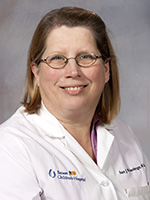Should adolescents see physicians without their parents' presence?
Note: This story appears in the April 2019 edition of CONSULT, the monthly e-newsletter published by the UMMC Division of Public Affairs that focuses on cutting-edge clinical advances, innovative educational programs and groundbreaking research occurring at UMMC. To receive CONSULT in your email, visit www.umc.edu/CONSULT to sign up
Many teenagers and young adults need more conversations with their health care providers, a recent study published in the Journal of Adolescent Health reports.
Researchers found only about half of respondents between the ages of 23 and 26 had ever had a confidential conversation with their doctors. The number was higher among young women, with 55 percent saying they had ever had private talks with their doctors. Among young men, that number was 49 percent.
For patients ages 13-14, the numbers were lower. Only 22 percent of girls and 14 percent of boys in the study had ever had time with their doctors away from their parents.
In the study, researchers found that those who had those confidential conversations with their health care providers reported higher satisfaction with their care and more positive attitudes about preventive measures such as vaccinations and counseling.

Adolescent health care at the University of Mississippi Medical Center follows American Academy of Pediatrics guidelines, said Dr. Sara Weisenberger, associate professor of pediatrics at UMMC and medical director of the Children’s of Mississippi Complex Care Clinic at the Jackson Medical Mall Thad Cochran Center.
Among those recommendations, according to Pediatrics, the official journal of the American Academy of Pediatrics,
Weisenberger said patient parents are asked to leave the examination room briefly during patient visits, depending on the age and the developmental level of the patient.
“We ask them (the adolescent patients) if they are happy at home and at school; if they use alcohol, tobacco or drugs; whether they have a boyfriend or girlfriend. and if they do, whether they are sexually active,” she said. “We also screen adolescents for signs of depression and, when appropriate, we refer them to a mental health professional.”
The question of confidentiality between a teen and a health care provider can be a judgment call.
“We try to maintain doctor-patient confidentiality in most cases,” Weisenberger said.
Confidentiality would be broken in cases when, for example, patients might be a danger to themselves or to others.
“We try to be confidential and assure our patients that the doctor’s office is a safe place,” she said.

Studies show confidential conversations can allow physicians to get the true picture of a teen’s health. Given the need for youths to learn how to communicate with health care providers, finding the right physician is crucial, according to Dr. Linda Pendleton, a clinical social worker in UMMC’s Division of Adolescent Medicine.
“Parents should find a physician who communicates well with their child and who their child trusts,” Pendleton said.
Weisenberger and Pendleton agree that giving adolescents the opportunity to speak one-on-one with their physicians also gives them the experience they’ll need in adulthood to be good health care consumers. They said by letting teens get experience talking with health care providers when their parents are in the exam room and when
Pendleton advises parents that as their children grow older, to let them take the lead in communicating during a doctor’s appointment.
“You want them to be able to express themselves, ask questions and receive information and be able to put that information to use,” she said.
Weisenberger said the teenage years are a time to prepare for adulthood.
“Children grow up, go away to college or move from home for work, and they won’t always be where their parents are,” she said. “As they grow up, we want them to make the transition into being advocates for their own health care.”



